Special announcement
A step by step guide: daad research grant application.

Applying to the DAAD Research Grant might look like a daunting task. We have explained the approach on where to start and how to proceed before submitting an online application.

In what order should I approach my preparation?
1. what prerequisite qualification will i need to meet.
As a rule, you will need to have:
- A very good higher education degree that is recognized in Germany. Generally, that is a degree equivalent to a German Master. This means you need to have completed 18 years (MS/ M Phil) of education in Pakistan.
- No more than six years should have passed since you gained the last degree.
In the past, applicants to the DAAD Research Grant programme have been expected to be faculty of a Pakistani university or research institution. Now, postgraduate students (having recently completed 18 years of education) or who are in the process of finalizing their M. Phil course or who are on an M. Phil leading to PhD programme or those who have already started their PhD research work without being employed at any university are eligible to apply.
For the programme announcement please visit DAAD Scholarship Programmes for Pakistan .
2. Find your research topic
The point to start from is the careful consideration of your research question. Please keep in mind that PhD is supposed to be based on previous research and findings in the specific field and to contribute new findings to the academic discourse. Thus, the following pre-knowledge is mandatory:
- Broad knowledge in your field as such.
- Knowledge of the state of research including the latest national and international publications in your field of specialization.
- Knowledge of methodology and its implementation. (Not just quantitative and qualitative methods but how exactly they are executed and to what purpose with expected results.
If you are not sure if you can master this, buy some books, sit down and read. For literature on your own field, read the international online journals which are mostly accessible from Pakistani universities. Please read the guideline How to Develop a Research Project and Write a Research Proposal [PDF 191.14 KB] .
3. Find a supervisor in Germany according to your research topic
The next step is to find a supervisor – a Doktorvater or Doktormutter . Please read the guideline How To Find A Supervisor [PDF 321.48 KB] carefully.
Keep in mind that you have to find a professor with matching research foci. The German professor is looking for somebody with an interesting project to join his/her team. So inform yourself very well about the ongoing research projects at his/her institute. Read all available information carefully including abstracts, of the ongoing research projects, but do not make contact with the professor at this stage!
A comprehensive search of the German research landscape can be conducted by using the Research Explorer (GERiT) or by visiting our PhD Germany database .
4. Develop the research proposal
Before contacting the supervisor, it is important that you have a well prepared synopsis of the doctoral dissertation you are planning to write. Please read the guideline How to Develop a Research project and Write a Research Proposal [PDF 191.14 KB] .
As a rule, every applicant is expected to submit a self written research proposal!
In case you are applying for a structured PhD programme, you also are required to submit a statement of purpose/ letter of motivation. The statement of purpose should describe in detail:
- why you are interested to carry out the proposed project (benefits for your career or for your country, gain of specific academic skills etc.),
- why you think you are fit to complete this project (similar projects in MPhil research? Read publications on the topic? Which ones?).
Please strictly obey the rules of good academic practice and never ever plagiarize from other people’s publication. Whatever is taken from another source word by word has to be enclosed in quotation marks followed by a reference to the original. Whenever you use other people’s ideas, you have to give the reference to the original.
5. Write to potential relevant supervisors
Next you have to write a careful introductory e-mail to a professor which you have identified in step 2 . Please follow the guideline How to make contact to a potential supervisor [PDF 192.90 KB] , before sending out any e-mail.
Always write a new e-mail to each professor and explain in detail why you think you will be a suitable member of his/her research team. Make sure you have read at least one of his/her online publications and refer to it in your e-mail. Add your draft research proposal and your CV. Also, please make sure that you have read the guideline Email Etiquette [PDF 71.65 KB] , for formal e-mail writing, carefully.
6. Scan all your academic records
Since you will be uploading all your previous and present academic records, therefore you have to scan all your transcripts and degrees in pdf format. These academic records include:
- SSC transcript and certificate,
- HSSC transcript and certificate,
- Bachelor transcripts (all semesters) and degree,
- M SC transcripts (all semesters) and degree,
- M Phil / MS transcripts (all semesters) and degree.
7. Create an account on the DAAD Portal
Since the application to the DAAD Research Grant has to be submitted online to the DAAD Portal , you will have to register yourself first and create an account.
8. Acquire letter of recommendations
While waiting for a response from the supervisor(s), you may acquire your letter of recommendations.
You can provide your referee with the pdf format generated from the DAAD Portal provided by DAAD to fill out, or use the letter head of the referee`s institution/university if otherwise not possible.
9. Submit your online application to the DAAD Portal
When you have gathered all the mandatory documents required to be submitted to the DAAD Research Grant, you may choose to submit your application on the DAAD Portal .
For more information on how to apply online to the DAAD Research Grant`s various categories please visit DAAD Scholarship Programmes for Pakistan .
Further information
- You have some additional questions? Please have a look at the Frequently Asked Questions (FAQ`s) section!
- More information for PhD students in our Downloads & Publications section under Research in Germany or on Research in Germany .
- Documents do not need to be certified at the time of online application! Certified copies have to be submitted only by successful candidates!
- IELTS or TOEFL is mandatory!
- Your application is only valid if you submit all the required documents to the DAAD Portal by the deadline!
- The DAAD Portal closes at 24.00 hrs. Central European Time (CET) on the last application day.
Advertisements by German Universities
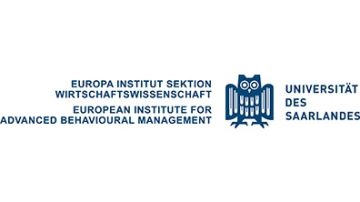
MBA European Management with special Entrepreneurship courses
Study the MBA European Management with a focus on Entrepreneurship at the heart of Europe and qualify for management positions around the world! Apply today and become a leader of the future!

Jumpstart your Career with our English taught Study Programs!
Our university is a lively hub of practice-oriented learning with cutting-edge research and a vibrant student community – it is just the right place to study!
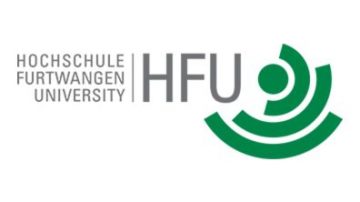
HFU – The time of your life
Located in the heart of the Black Forest - experience freedom in every breath - join our international community!
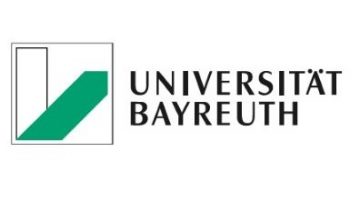
Unlock the impact of religion on our global futures at Bayreuth
Do you want to address critical issues about how religion is shaping our shared futures? Are you interested in understanding these issues from an innovative, global perspective? Then come to the Unive...
DAAD Pakistan
DAAD Information Centre Islamabad
Freie Universität Berlin
Service navigation.
- Legal Notice
- Privacy Policy
- Accessibility Statement
- Prospective Students
- Students and Doctorate
- Researchers
- Alumni and Supporters
- Journalists
- Continuing Education
- Berlin Program for Advanced German and European Studies
Path Navigation
- Application
Research Proposal
Information for All Applicants
A research proposal should be clear, coherent and compelling, contain all the key elements involved in the research process and include sufficient information for the committee to evaluate the proposed study. The proposal should situate the project’s objectives in the context of existing research, debates and literature on the topic. The research design should be realistic in scope and responsive to theoretical and methodological concerns of a particular discipline but should also be of demonstrable cross-disciplinary interest. Applicants should show an appropriate level of training and skill to undertake the proposed study, including evidence of language fluency adequate to complete the project and participate in the German language colloquium at the Freie Universität Berlin.
Applicants should demonstrate a sound knowledge of the local academic context and the available research resources and specify why an extended period of research in Berlin is critical to the successful completion of their proposed research.
Regardless of the discipline, research area, the methodology and academic level of the research project, all proposals should include the following information:
- An explicit statement of the major questions to be explored or hypotheses to be tested.
- Importance of the research to disciplinary concerns.
- An explicit description and justification of the research methods.
- Availability and quality of sources/material/data.
- Preliminary research already completed or plans for research prior to going overseas.
- Proposed location(s) for research and explanation of why the project requires overseas research and why Berlin is of particular significance for the project.
- Contacts/affiliations which have or will be established with institutions/interview partners etc. relevant to the proposed research project in Berlin/Germany/Europe.
- A research schedule with bimonthly target dates as well as reflections on possible challenges and how to address them. Include the local sources (archives, libraries, museums, data, institutions, individuals) you will be working with or are planning to work with.
- Bibliography listing most important topical sources including German-language publications - or other European language publications respectively - which reflect the state of research on your topic.
Information for Postdoc Applicants
The Berlin Program funds recent postdocs, i.e. applicants whose Ph.D. was conferred in the last two calender years or will be conferred before the fellowship - if granted - would begin.
An application for a postdoc fellowship may involve:
- revising a dissertation into a book manuscript,
- launching a new research project,
If you are proposing a dissertation revision, state this, explaining the changes to the manuscript that you plan, and how you will accomplish these goals. Use this the opportunity to highlight how your dissertation contributes to the field, but also how your proposed research will advance your study. Make sure you clearly describe the questions you will ask beyond those examined in your dissertation. As you will have the potential readership of your future book in mind and try to extend the publication’s reach to the broader academic community, reflect on additional research questions, analysis of additional sources/data/literature.
If you are applying for support of a new project, and this may seem a bit of a challenge as you are still finishing your dissertation and had not had time to work on the new project, do not be alarmed. As described above, provide an overview of the new project, explaining the basic ideas, problems, or questions examined by your research, i.e. help the committee get the bigger picture and the new avenues you are pursuing. You could reflect on how the new research connects to your existing work or adds new dimensions in your research foci (e.g. a change of century, adding a comparative dimension, or a shift in methodology etc.). Identify the methods, sources etc. by which you will accomplish these research goals. Describe how the project will complement, challenge, or expand relevant existing knowledge in the field. Demonstrate your ability to do this in the time line submitted.
If you are apply for funding to both revise your launch a new project, make sure you include both titles in the project description, the research proposal and the research schedule. If applicable, explain the connection between the both.
Learn from our skills workshop How to Become a Superapplicant run in November 2021 by BP alumni Veronika Fuechtner (Dartmouth College) and Johannes von Moltke (Michigan University).
Continue with Pointers and Advice .

How to write the best research proposal (Phd)? Crafting…
How to write the best research proposal (phd).
- Purposeful Introduction: Articulate the rationale behind your proposal. Clearly elucidate the objectives of your research project, painting a vivid picture of its significance.
- Detailed Project Description: Delve into the specifics. Outline the scope and boundaries of your research. Highlight what your study encompasses and what it purposefully excludes.
- Research Aims: Define the overarching goals. What insights do you aspire to glean? How will your research contribute to your field? Unveil the questions you aim to address.
- Focused Problem Statement: Spotlight the issue at hand. Articulate the problem you’re addressing and explain why it merits attention in your field.
- Literature Review: Incorporate key scholarly works. Integrate relevant studies that shape the backdrop of your research, showcasing your understanding of the existing landscape.
- Impeccable Presentation: Fine-tune grammar and spelling. Ensure your communication is error-free, amplifying the professionalism of your proposal.
What are individual doctorates?
Can i receive financial assistance as a student with children in germany.

How to apply for a Schengen Visa and have their application accepted?…

What happens if you get your German Visa rejected by the embassy?…

When does The ETIAS system launch? The system will launch in 2021….

Are you interested in visiting the amazing nature Europe has? Beautiful landscapes…
Do you need a student visa or resident permit to study in germany.

How do I extend my stay on the B-1/B-2 visa? If your permitted stay…

In which activities can U.S. Tourist Visa Holders engage in? B-2 Visa holders can…

What rights does the Green Card give to its holders? The US Green Card…

Required Forms for the Immigrant Spouse Visa? The required Forms for the Immigrant Spouse…
What are the requirements for international students seeking a phd in germany.

Is it important to submit your application before the deadline? Meeting deadlines…

How can you extend your Business Visa? Only in exceptional situations may…

What type of visa is the German Work Visa? The German Work…

Requirements for the issue of visas! For Germany and all other Schengen…
What is the procedure for applying for a daad scholarship in germany, what kind of scholarships does daad offer to phd candidates, why do your phd in germany, related posts, what are the english language proficiency requirements for a…, who requires a visa for studying in germany, what opportunities does germany provide for international phd students, can a phd student’s spouse work in germany the…, what should your phd application include begin by highlighting….
Cookie Consent
To improve the website, the DAAD and third parties set cookies and process usage data . In doing so, the DAAD and third parties transfer usage data to third countries in which there is no level of data protection comparable to that under EU law. By clicking the "Accept all" button, you consent to this processing. You can also find selection options and explanations of these cookies and processing at the end of this page under "Cookies". There you can withdraw consent at any time with effect for the future.
- Privacy Policy
Jump to content
First steps to your PhD
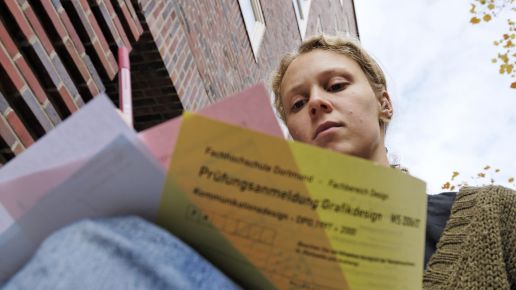
Before starting your doctoral studies in Germany, there are some important steps you have to follow:
- Have your post-graduate degree recognised
- Apply for a residence permit
- Find a doctoral position
- Finance your research stay
To find some practical advice on preparing your research stay - visit: www.research-in-germany.org > phd
Deutscher Akademischer Austauschdienst e.V. Kennedyallee 50 53175 Bonn
All addresses in the DAAD Network
DAAD Newsletters
Receive regular up-to-date information about our work and organisation.
Newsletter - DAAD
Useful Links
- Find Scholarships
- DAAD offices worldwide
Jump to top of page

- News in English
- News in German
- Press Releases in German
- Imprint/Contact
- Institutions
- Prospective Students
Doctoral Candidates
- Postdoctorates
- Tenure-Track-Professors
Access to a Doctorate
The information below is to give potential doctoral candidates a general idea of doctoral studies at Humboldt-Universität. They might be helpful to you to make your decision.
- Requirements
- PhD in Germany
- Welcome to Research in Germany
- Supervision
- How to Obtain a Doctoral Degree
- Doctoral Theses Guidelines (Promotionsordnungen) (in German)
- Supervision of External Doctoral Dissertations
- How to Write a Research Proposal
The Humboldt Research Track Scholarship funding line is intended to facilitate the transition from undergraduate studies to doctoral studies for students pursuing a doctorate at Humboldt-Universität by providing a qualifying scholarship. Students with excellent academic performance and whose doctoral project promises high quality and originality can apply for the scholarship already in their master's studies upon proposal of their supervisor.
HU on the internet
- Humboldt University on Facebook
- Die Humboldt-Universität bei BlueSky
- Humboldt University on Instagram
- Humboldt University on YouTube
- Humboldt University on LinkedIn
- RSS-Feeds of the Humboldt University
- Humboldt University on Twitter
- Plan Your Studies
- Study Programs
- Universities
- Requirements
- Living in Germany
- Accommodation
- Statistics & News

How to Apply for a PhD in Germany: Programs, Funding, & FAQs
If you’re considering advancing your academic journey with a PhD and have a passion for conducting research in your field, Germany could be an excellent destination for you. With its top-tier universities, exciting research opportunities, financial support, and diverse culture, Germany stands out as an excellent choice for PhD studies.
These are the main steps to doing a PhD in Germany:
Find a PhD Program and a Supervisor
- Decide Between Individual and Structured PhD Programs
- Meet All Requirements & Prepare Your Application
Apply for Doctoral Studies
Secure funding, get a student visa or resident permit, arrive in germany and begin your phd program, why pursue a phd in germany.
Here are some compelling reasons to pursue a PhD in Germany:
- Top universities. Germany boasts four universities ranked in the top 100 globally, offering access to world-class education and research facilities.
- International student community. Germany welcomes a diverse and thriving international student community, with over 458,210 international students studying across the country.
- Abundant research institutions. Germany’s 1,000+ publicly funded research institutions, spanning universities, applied sciences, research institutes, businesses, and government bodies, offer countless opportunities for collaboration and networking.
- Investment in research and development. Germany’s commitment to research and development is evident through its increasing expenditure, which reached a record high of 112.6 billion euros in 2021.
- Strong economy. Germany is known for its robust and stable economy, offering potential career opportunities in academia, industry, and research sectors after completing your PhD.
How to Apply for a PhD in Germany
Below, you will find all the steps you need to take, from discovering your perfect program to submitting your application and commencing your PhD adventure in Germany.
To start your PhD in Germany, define your research focus by considering your interests and academic background. Explore resources, attend conferences, and connect with professors. Use online sources, engage with academic communities, and seek advice from current PhD students for insights into the research scene.
If you’re already clear about your research direction, it’s time to search for suitable programs. The German Academic Exchange Service (DAAD) provides a comprehensive database of current opportunities, which you can explore at the DAAD PhD Database . Additionally, consider researching universities in Germany individually to understand what each institution offers in terms of research and programs.

Study at Berlin School of Business and Innovation
Creating Tomorrow's Industry Leaders
You will also have to find a supervisor. One way to do so is by visiting university websites to find faculty directories with profiles of professors and their research interests. Contact professors whose work aligns with your research interests, express your interest and inquire about supervision opportunities.
> You can search PhD programs using the GERiT database , which features over 31,000 research institutions.
Types of PhD Programs in Germany
Before you start searching for a PhD program, it’s essential to understand that in Germany, there are two different paths you can take when pursuing a PhD, each with its own set of advantages and opportunities.
Individual PhD Programs
An individual doctorate program is considered the more common and traditional PhD route in Germany. It is a flexible and self-directed path to earning a doctoral degree, particularly in fields like humanities and social sciences. You take the initiative to find a supervisor (called “Doktorvater” or “Doktormutter”) for your research project and often suggest your research topic.
There’s no fixed curriculum, giving you the freedom to set your research timeline and choose coursework. This approach requires self-discipline and active networking, including participation in doctoral candidate meetings and research events.
Structured PhD Programs
Structured PhD programs in Germany offer a clear path to a PhD degree, typically lasting three to five years. Unlike individual doctorate studies, they include a curriculum, research proposal submission that has to fit an existing program, and a set timeline for coursework and research.
Candidates benefit from advisor supervision and are encouraged to collaborate across disciplines, making structured programs ideal if you’re seeking a guided and comprehensive doctoral experience.
Ensure You Meet All Requirements & Prepare the Application
The requirements and application documents for a PhD in Germany can vary depending on your chosen institution and research area. However, as a general guideline, you should prepare the following:
- Academic degree recognized in Germany. Typically, you’ll need a master’s degree or a German state examination (Staatsexamen) to qualify for a PhD program.
- Copy of master’s thesis. Provide a copy of your master’s thesis, showcasing your research skills and the depth of your academic work.
- Research proposal. Craft a clear and comprehensive research proposal outlining your intended research topic, objectives, methodology, and significance.
- Statement of purpose. Write a statement of purpose explaining why you wish to pursue a PhD in your chosen field, your academic and career goals, and how this program aligns with your aspirations.
- Curriculum Vitae (CV). Prepare a detailed CV highlighting your academic achievements, research experience, relevant coursework, publications, and any other qualifications.
- Proof of language proficiency. Depending on the language of instruction (usually German or English), you may have to provide proof of language proficiency. You can do this with certificates like TestDaF, DSH, TOEFL, IELTS, or proof of previous studies in the language.
- Academic references. You may need to provide contact information or recommendation letters from professors or academic advisors confirming your academic abilities and research potential.
- Predoctoral examination. Some programs may require you to pass a predoctoral examination as part of the application process.
Once you’ve found a suitable PhD program and a mentor, and your academic qualifications are recognized in Germany, you can start your application. Depending on the university or research institute, you can apply online or by post, so it’s essential to check their specific requirements. Keep in mind that admission committees are selective and may conduct interviews to admit the best candidates.
Securing funding is a crucial step when preparing for a PhD in Germany. To meet visa requirements and stay in the country, you must demonstrate access to a minimum of €934 per month, totaling €11,208 annually. This proof can be provided through an admission agreement or relevant contract, or you can open a blocked account with individual funds.
There are various ways to financially support yourself while pursuing a PhD in Germany:
- PhD scholarships. DAAD offers the highest number of doctoral scholarships. PhD students get an average monthly stipend of €1,139.
- Paid PhD positions. Many universities and research institutions offer paid PhD positions in Germany. You will have a contract and work on specific research projects while receiving a salary.
- Research associate positions. You can also work as a research associate in a university, research institution, or company and receive a salary as compensation.
- Part-time jobs. Some PhD students/researchers work part-time jobs that are not related to their studies to secure additional income.
> Read more about the costs associated with studying in Germany.
> Explore scholarship opportunities.
Once your acceptance into the PhD program is confirmed by the university or institution, you can begin the process of applying for a student visa or residence permit. The PhD visa or permit requirements for Germany can vary depending on your nationality and individual circumstances:
Visa Requirements
Citizens of the EU, the European Economic Area (EEA), and Switzerland do not need any special permit or visa to pursue a PhD in Germany. They can research and work with just a valid passport or ID card.
For international researchers who are not citizens of the EU, EEA, or Switzerland, a visa will be required to work as a researcher in Germany.
The type of visa you need depends on your specific situation:
- Study visa. If you’re pursuing a full-time doctoral program, you may apply for a student visa.
- Research visa. If your focus is on research and you have a formal affiliation with a research institution in Germany, you can apply for a research visa.
- EU Blue Card. If your PhD offer includes a gross annual salary of at least €45,300 (or €41,041.80 in certain professions), you may be eligible for an EU Blue Card, which is a special residence title for international academics.
Residence Permit Requirements
Once you arrive in Germany, you’ll need to apply for a residence permit based on the visa you have:
- Study permit. If you’re accepted into a PhD program at a German university, you can get a study-based residence permit for up to two years, extendable.
- Research permit. If you’re a researcher with the right qualifications for doctoral programs, you can get a research permit for Germany. This requires a contract with a research institution for your project.
- EU Blue Card. You may be eligible for the EU Blue Card, which is for foreign academics and qualified workers in Germany. To get it through a PhD offer, your salary should be at least €45,300 per year, or €41,041.80 for certain bottleneck professions .
*Note that nationals of certain countries , including the United States, Australia, Israel, Japan, and Korea, who are not required to obtain a visa, must still apply for a residence permit.
> For more specific information tailored to your situation, we recommend contacting the German embassy or consulate in your home country. You can also use this visa navigator.
Arriving in Germany and commencing your PhD program is an exciting step, but there are certain formalities you need to take care of. The international office at the university or a representative can guide you, however here are the main things to take care of once you’re in the country:
Register Your Residence
Shortly after your arrival, you must register your residence at the local registration office (Einwohnermeldeamt or Bürgeramt). This is mandatory, and you typically have a window of two weeks to complete this process.
Obtain Health Insurance
Everyone in Germany, including international PhD students, is obligated by law to have health insurance coverage . The type of health insurance you are eligible for depends on the source of your funding:
- Doctoral candidates with an employment contract are typically insured automatically with a state-regulated health insurance provider (Gesetzliche Krankenversicherung -GKV)
- Doctoral candidates without an employment contract (with a fellowship or private funding) may choose between:
- Voluntary health insurance coverage with a state-regulated provider.
- Coverage with a private health insurance company.
Some exceptions allow you to retain your insurance from your home country, such as students from a European Union (EU) country or other countries with social security agreements with Germany.
Open a Bank Account
It’s advisable to open a German bank account as soon as possible. Many financial transactions in Germany, including receiving your stipend or salary, are typically done through a German bank account.
Enrollment at University
If your PhD program requires enrollment at a university, you’ll need to complete this step. Submit the necessary documents to the university’s enrollment office, which may include your admission letter, passport, proof of health insurance, and proof of financial means.
Frequently Asked Questions (FAQs)
There’s a lot to think about when you’re considering pursuing a PhD, especially if it’s in a foreign country. We’re sure you’ve got more questions, and we’re here to help.
What Is the Duration of a PhD Program in Germany?
In general, a PhD program in Germany typically lasts between three to six years.
The duration of a PhD program in Germany can vary depending on several factors, including the university, the subject area, and individual progress.
Are PhD Programs in Germany Tuition-Free?
Most PhD programs in Germany are tuition-free, at least for the first six semesters. However, if you are enrolled at a university, you will need to cover a semester fee. This can vary depending on the university but usually falls within the range of €100 to €350.
Is Knowing German Mandatory to Pursue a PhD in Germany?
Knowing German is not always mandatory to pursue a PhD in Germany. Many German universities offer PhD programs in English, especially in fields like science, engineering, and the humanities. In such programs, you can write your thesis and communicate with professors and peers in English.
However, language requirements differ by university and department. If your program is in German, you might need to prove your proficiency. Knowing German can also be helpful for daily life and integration if you’re living in Germany.
Will I Get a PhD Salary in Germany?
PhD candidates in Germany, whether affiliated with universities, research institutions, or companies collaborating with them, typically receive financial support in the form of a salary or grant.
The majority of doctoral positions are structured under the TV-L (Tarifvertrag im Öffentlichen Dienst) salary scale, often falling within the TV-L 13 category, with a salary range spanning from €4,188 (Tier 1) to €6,037 (Tier 6).
Salaries are typically determined based on a wage agreement that specifies the contract tier (Stufe) and working hours (percentage-based). Many entry-level PhD students start with tier 1 contracts that are not full-time. For example, if your contract places you in Pay Group E-13 Tier 1 of the TV-L and you work at 75% capacity, your monthly gross salary will be €3,141.
Can I Work While Pursuing a PhD in Germany?
It’s generally allowed for PhD students in Germany to have part-time jobs to cover living expenses. However, the rules and expectations can vary depending on your supervisor, field of study, and specific circumstances.
While part-time work is an option, keep in mind that pursuing a PhD can be quite demanding, often requiring long hours of research and study. It’s essential to find the right balance between work and your academic commitments. Additionally, make sure to be aware of any legal and contractual obligations related to your employment while studying for your PhD.
What Is the Process for Defending a PhD Thesis in Germany?
In Germany, defending your PhD thesis involves several steps. You start by submitting your thesis and necessary documents, making sure they meet all the formal requirements. A commission is formed, and you may have the opportunity to suggest reviewers.
Then, you will have to prepare and undergo an oral defense, which can be either public or private and typically lasts between 30 minutes to 2 hours. During this, you present your research and discuss it with the committee.
The outcome of this discussion determines your final grade, which you receive after the defense. If everything goes well, you’re granted the Ph.D. title and have about two years to publish your dissertation.
What Are the Career Prospects After Completing a PhD in Germany?
After completing a PhD in Germany, career prospects are promising. Graduates often find opportunities in academia as professors or researchers or in various industries, including technology, healthcare, and finance. Germany’s strong economy and research-oriented environment make it an attractive place for career development.
Join 262,114 students interested in studying in Germany

Download The Guide

Quick Links
8 Steps to Study in Germany How To Apply To Study in Germany German Education System Requirements Universities in Germany International Programmes Financing Your Studies German Student Visa German Health Insurance Germany Blocked Account Learn German Guide German Cities Cost of Living
Latest News and Statistics
Germany scholarships up by 3% in 2023 – 31,400 students benefited, germany to double annual work visa quota for western balkans from june 1, indians overcome chinese as top source of international students in germany, over 3,800 university students in germany were under 18 in 2022, higher education in germany: key trends & statistics.
- Privacy Policy
- Cookie Policy


How to Write a PhD Research Proposal
- Applying to a PhD
- A research proposal summarises your intended research.
- Your research proposal is used to confirm you understand the topic, and that the university has the expertise to support your study.
- The length of a research proposal varies. It is usually specified by either the programme requirements or the supervisor upon request. 1500 to 3500 words is common.
- The typical research proposal structure consists of: Title, Abstract, Background and Rationale, Research Aims and Objectives, Research Design and Methodology, Timetable, and a Bibliography.
What is a Research Proposal?
A research proposal is a supporting document that may be required when applying to a research degree. It summarises your intended research by outlining what your research questions are, why they’re important to your field and what knowledge gaps surround your topic. It also outlines your research in terms of your aims, methods and proposed timetable .
What Is It Used for and Why Is It Important?
A research proposal will be used to:
- Confirm whether you understand the topic and can communicate complex ideas.
- Confirm whether the university has adequate expertise to support you in your research topic.
- Apply for funding or research grants to external bodies.
How Long Should a PhD Research Proposal Be?
Some universities will specify a word count all students will need to adhere to. You will typically find these in the description of the PhD listing. If they haven’t stated a word count limit, you should contact the potential supervisor to clarify whether there are any requirements. If not, aim for 1500 to 3500 words (3 to 7 pages).
Your title should indicate clearly what your research question is. It needs to be simple and to the point; if the reader needs to read further into your proposal to understand your question, your working title isn’t clear enough.
Directly below your title, state the topic your research question relates to. Whether you include this information at the top of your proposal or insert a dedicated title page is your choice and will come down to personal preference.
2. Abstract
If your research proposal is over 2000 words, consider providing an abstract. Your abstract should summarise your question, why it’s important to your field and how you intend to answer it; in other words, explain your research context.
Only include crucial information in this section – 250 words should be sufficient to get across your main points.
3. Background & Rationale
First, specify which subject area your research problem falls in. This will help set the context of your study and will help the reader anticipate the direction of your proposed research.
Following this, include a literature review . A literature review summarises the existing knowledge which surrounds your research topic. This should include a discussion of the theories, models and bodies of text which directly relate to your research problem. As well as discussing the information available, discuss those which aren’t. In other words, identify what the current gaps in knowledge are and discuss how this will influence your research. Your aim here is to convince the potential supervisor and funding providers of why your intended research is worth investing time and money into.
Last, discuss the key debates and developments currently at the centre of your research area.
4. Research Aims & Objectives
Identify the aims and objectives of your research. The aims are the problems your project intends to solve; the objectives are the measurable steps and outcomes required to achieve the aim.
In outlining your aims and objectives, you will need to explain why your proposed research is worth exploring. Consider these aspects:
- Will your research solve a problem?
- Will your research address a current gap in knowledge?
- Will your research have any social or practical benefits?
If you fail to address the above questions, it’s unlikely they will accept your proposal – all PhD research projects must show originality and value to be considered.
5. Research Design and Methodology
The following structure is recommended when discussing your research design:
- Sample/Population – Discuss your sample size, target populations, specimen types etc.
- Methods – What research methods have you considered, how did you evaluate them and how did you decide on your chosen one?
- Data Collection – How are you going to collect and validate your data? Are there any limitations?
- Data Analysis – How are you going to interpret your results and obtain a meaningful conclusion from them?
- Ethical Considerations – Are there any potential implications associated with your research approach? This could either be to research participants or to your field as a whole on the outcome of your findings (i.e. if you’re researching a particularly controversial area). How are you going to monitor for these implications and what types of preventive steps will you need to put into place?
6. Timetable

We’ve outlined the various stages of a PhD and the approximate duration of a PhD programme which you can refer to when designing your own research study.
7. Bibliography
Plagiarism is taken seriously across all academic levels, but even more so for doctorates. Therefore, ensure you reference the existing literature you have used in writing your PhD proposal. Besides this, try to adopt the same referencing style as the University you’re applying to uses. You can easily find this information in the PhD Thesis formatting guidelines published on the University’s website.
Finding a PhD has never been this easy – search for a PhD by keyword, location or academic area of interest.
Questions & Answers
Here are answers to some of the most common questions we’re asked about the Research Proposal:
Can You Change a Research Proposal?
Yes, your PhD research proposal outlines the start of your project only. It’s well accepted that the direction of your research will develop with time, therefore, you can revise it at later dates.
Can the Potential Supervisor Review My Draft Proposal?
Whether the potential supervisor will review your draft will depend on the individual. However, it is highly advisable that you at least attempt to discuss your draft with them. Even if they can’t review it, they may provide you with useful information regarding their department’s expertise which could help shape your PhD proposal. For example, you may amend your methodology should you come to learn that their laboratory is better equipped for an alternative method.
How Should I Structure and Format My Proposal?
Ensure you follow the same order as the headings given above. This is the most logical structure and will be the order your proposed supervisor will expect.
Most universities don’t provide formatting requirements for research proposals on the basis that they are a supporting document only, however, we recommend that you follow the same format they require for their PhD thesis submissions. This will give your reader familiarity and their guidelines should be readily available on their website.
Last, try to have someone within the same academic field or discipline area to review your proposal. The key is to confirm that they understand the importance of your work and how you intend to execute it. If they don’t, it’s likely a sign you need to rewrite some of your sections to be more coherent.
Browse PhDs Now
Join thousands of students.
Join thousands of other students and stay up to date with the latest PhD programmes, funding opportunities and advice.
- { expandedNavigation=true; activeIndex=0; }"> Research landscape
- { expandedNavigation=true; activeIndex=1; }"> Your goal
- { expandedNavigation=true; activeIndex=2; }"> Plan your stay
- { expandedNavigation=true; activeIndex=3; }"> Success stories
- { expandedNavigation=true; activeIndex=4; }"> Our service
- R&D policy framework
- Research infrastructure
- Research funding system
- Universities
- Universities of applied sciences
- Technical universities
- Top universities
- Fraunhofer-Gesellschaft
- Helmholtz Association
- Leibniz Association
- Max-Planck-Gesellschaft
- Academies of sciences and humanities
- Federal institutions
- State research institutions
- What is R&D in German business?
- Why is collaboration important?
- Which sectors carry out R&D?
- Which are the leading companies?
- How do German businesses compare internationally?
- How is the start-up scene set up?
- How do I start a career?
- Good reasons
Two ways to get your PhD
- Find your PhD position
- How to apply for a PhD
- Funding programmes
- Funding organisations
- Funding databases
- Job portals
- Career options & dual careers
- Funding & awards
- Potential employers
- Research fields
- Entry and residence
- German money-saving tips
- Cost of living
- Social insurance and health
- Bringing your family
- Information for your partner
- Support for families
- Finding a place to live
- Funding opportunities
- Recognition of professional qualifications
- Counselling
- Latest Thinking
- First-hand experiences from international researchers
- On-site consultation
- Our publications
- Research news
- Online talks
- Topics in focus
A doctorate is the highest academic degree that a university can award. In Germany, studying for a doctorate primarily means working intensely on a specific subject or research project for a long period of time. It typically takes five to six years to obtain a doctorate, though the length of time can vary.
How to obtain a PhD in Germany
If you decide to do a doctorate, you can choose between different forms of study. Depending on your discipline, research area, personal circumstances and formal qualifications, there are two different paths:
- Individual doctorate The individual doctorate is based on independent research carried out alone under the supervision of one professor. This is the traditional path followed by over three quarters of all doctoral students in Germany.
- Structured PhD programmes These programmes offer a form of study similar to that found in English-speaking countries. You will be supervised by a team and will attend courses, lectures and seminars together with other doctoral students. Normally, such programmes are publicly advertised and often feature grants or paid doctoral positions.
Individual doctorate
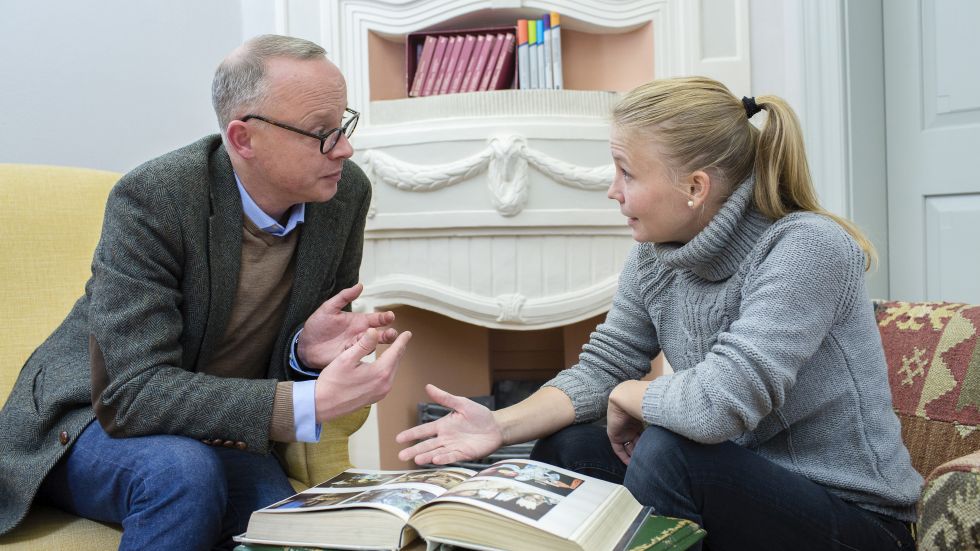
DAAD/Jan Zappner
The "traditional" or "individual" path to a PhD remains the most common in Germany. An individual doctorate involves a thesis or dissertation that is produced under the supervision of one professor .
This form of PhD study offers a great deal of flexibility , but also demands a high degree of personal initiative and responsibility . A professor supervises a PhD student, who works on his or her subject in consultation with the professor, but largely independently .
How long a traditional individual doctorate takes depends on your own time schedule – or on the duration of your work contract. On average, you can expect it to take five to six years . Although a university is normally responsible for the doctoral process, you can also carry out your research at other institutions.
Depending on your subject, research area and interests, you can choose whether to work on a research project and your PhD at a university or non-university research institute – or indeed in industry. However, no matter where you conduct your research, a professor will always supervise your PhD.
You can obtain a doctorate by pursuing research:
- at a university
- at a non-university research institute or
- in a German company
PhD at a university
The "typical" PhD student in Germany works – usually part-time – as a research associate at his or her university. Although research is generally part of the job description, most of the associate’s own doctoral research usually has to be carried out outside working hours. How closely teaching, research and/or administrative duties are actually tied into the doctoral student’s own research depends very much on the individual situation.
PhD at a non-university research institute
Non-university research establishments – such as the Fraunhofer-Gesellschaft , Helmholtz Association , Leibniz Association and Max Planck Society – offer an excellent research environment in which to conduct your research. These institutions do not have the right to award doctorates themselves, but collaborate with universities for that purpose. They offer PhD students scholarships and/or (usually fixed-term) contracts of employment – or a combination of the two. However, support is also possible in the form of regular research posts, which are especially typical of Fraunhofer-Gesellschaft and the Max Planck Society.
PhD in industry
Graduates who decide to work in industry and study for a doctorate part-time – often with funding and support from their employer – also need a university professor to supervise their research. In some cases, the employer will already be collaborating with a university or research institute and can help the PhD student find the right supervisor.
People who have PhD research posts within a company usually have part-time temporary contracts and work on a research project that allows them to pursue their doctoral research under the supervision of a professor. When a university and an industrial company collaborate in specially established institutes, doctoral researchers usually work on their projects with their professor and a supervisor from the company.
More information:
Find your individual doctorate
The traditional individual path to a doctorate remains the most common in Germany. In this case, the doctoral student works for the most part independently on their thesis, though in consultation with their supervising professor.
Structured PhD programmes
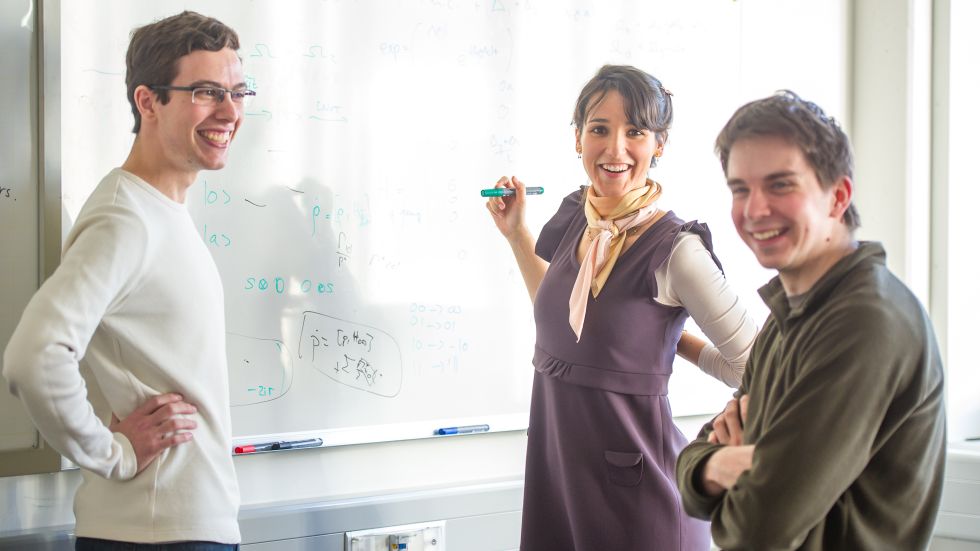
DAAD/Volker Lannert
Structured doctoral programmes often have a strong international orientation with English as the team language. Unlike the individual doctorate model that can be freely structured to suit the individual research project, here doctoral students and their research proposals have to fit in with an existing PhD programme.
The doctorate frequently entails a clearly structured doctoral study programme with compulsory attendance at lectures or seminars and interim assessment (credit points). The programme frequently also covers academic and scientific methods or soft skills , such as presentation techniques.
As a rule, PhD Students work steadily at realising their research project within the team and with intensive support from a group of academic staff (often referred to as the “thesis committee”).
The duration of your studies is generally limited to three to five years, and there is usually a fixed curriculum within which you work toward your doctorate and write your thesis.
Find your structured PhD programme
Though no database containing all structured PhD programmes in Germany is available yet, we can point you in the direction of databases that will help you find what you are looking for nonetheless, where to obtain information about eligibility requirements and how to apply.

Check out our brochure:
Doing a phd in germany (2019, 40 pages).
This booklet for (prospective) international doctoral students presents the different options for doing a doctorate in Germany. It explains the formal requirements and gives some practical advice on finding the right supervisor or doctoral programme. It also outlines different sponsorship and funding options.
PhD Studies
Planning your phd, eligibility and application, german or english medium, living as a student, working in germany, get guidance.
With a long tradition of research and ground breaking discoveries, Germany is indeed a land of innovation and progress. Besides giving your ideas a research-based boost, Germany also offers promising career opportunities along with a vibrant social and cultural milieu. So like for many other international students, it can be the right place to pursue a doctoral degree for you too!
Take a quick look

Zum Aktivieren des Videos klicken Sie bitte auf das Vorschaubild. Wir möchten Sie darauf hinweisen, dass nach der Aktivierung Daten an den jeweiligen Anbieter übermittelt werden. Auf YouTube ansehen
Starting your doctoral studies is a big step in your academic life. Along with identifying your research area you also have to plan where and in which institute you want to pursue your PhD.
Where does research take place in Germany?
Contemplating pursuing a PhD in Germany? There are a number of universities, research institutions and business houses that will welcome you. So getting an insight into the research landscape of the country is of paramount importance!
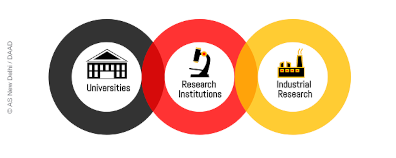
© DAAD India
Research is extensively carried out by and through universities, research organisations and the industry. These three are famously known as the three pillars of research in Germany.
You can take a closer look at this on Research in Germany .
Which universities should I look at for PhD?
There are various kinds of institutions of higher education in Germany. A majority of these belong to either of the following categories:
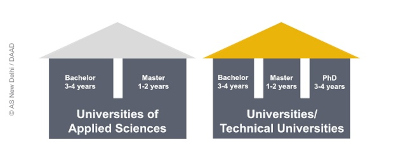
Universities and Universities of Technology (TU), are research-oriented and offer a wide variety of subjects. These are the only establishments that can award a PhD degree.
In case you are carrying out your PhD at a research organisation/ University of Applied Sciences, it will always be through a partner university/TU that you will get your degree. Therefore it is important that you fulfill the eligibility criteria of the university/TU as well.
Before you finalise a university or a research institution make sure to check out their websites to know what kind of research is already going on there.
Which is the best university in Germany?
There is no “best university”, neither in one subject and certainly not across all subjects.
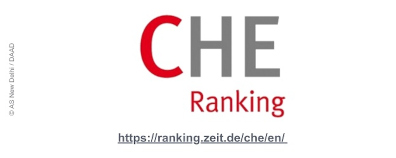
DAAD India © CHE Ranking
Germany offers a multidimensional ranking, considering various criteria that are important from a student’s perspective. For example, student and staff judgments on quality of teaching, atmosphere at the university, library and other equipment, student numbers, average study duration, number of graduations, third party funding etc. This way you get a detailed picture of the strengths and weaknesses of each university on university-ranking.de . Here you can find your programme by selecting a subject, a university or even a city in Germany!
As a researcher you should also take the research rankings into consideration. The criteria for such rankings could be research infrastructure, citations, patents, publications and student reviews, to name a few.
How should I plan my doctorate?
If you have set your mind on a PhD in Germany, you can consider two approaches: the traditional approach i.e. individual doctorate and the structured doctoral programmes.
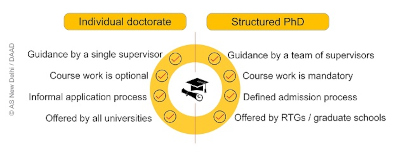
Individual doctoral studies involve identifying a supervisor ( Doktorvater / Doktormutter ) at a German university who is willing to guide your research. This system offers a lot of freedom, and calls for a great deal of personal initiative right from identifying a topic in your research field. This kind of doctorate takes about 3-5 years to complete.
Structured PhD programmes are internationally oriented, conducted largely in English and are comparable to PhD programmes offered in English-speaking countries. Here supervision is carried out by several university teachers. These programmes lead to a PhD in about three years.
What if I want to do a part of my PhD research in Germany?
The research Grant: Bi-nationally Supervised Doctoral Degrees / Cotutelle which is also famously known as DAAD Sandwich Scholarship lets you complete your PhD in two countries. The first country being your home country where you are registered as a doctoral student and the second country is but naturally Germany.
You are supervised at your home university as well as at the host institute in Germany. Your doctoral degree is awarded by the home institution. This is the well known “sandwich model”.
While generally as a Master degree holder you will have ticked off the first major requirement, it is always a good idea to check if the university’s requirements and your qualifications match. And then you can start with the application procedure.
Am I eligible to apply for a PhD?
In Germany, every university is autonomous. This means that every university/ study programme has its own set of criteria for admitting students. So please check the university website, and specifically the programme you are interested in. Here you will find the exact admission requirements.
However, some generalisation is possible. As a Master degree holder from Bangladesh, Bhutan, India, Nepal or Sri Lanka your degree is treated at par with a German Master degree. In some cases, further assessment of eligibility will be required. Do clarify the matter of eligibility with the university or the research organisation of your choice before you send in your application.
Some universities may ask for the proof of your English language proficiency in form of TOEFL or IELTS scores. Some universities may ask for good German language skills depending upon subject of your research. In such cases, your knowledge of German needs to be certified through examinations like the TestDaF or DSH.
How do I go about applying for a PhD?
- PhD Germany – A portal where German universities advertise openings for doctoral positions
- An interactive database of Graduate Schools at German universities
- Research Training Groups coordinated by the German Research Foundation (DFG)
- International Max Planck Research Schools (IMPRS) Academicians from your country who have collaborations with German academicians or your seniors who might be carrying out research in Germany can be a great source of information too!
- Contact and convince a supervisor. Make sure that you approach a potential supervisor the right way and in good time – a brief and well-structured communication with an overview of your research proposal and relevant information about yourself is more likely to get you the right kind of response than a simple email stating that you are interested in doing a PhD!
- Communicate information about your background, academic performance and academic goals.
- Get a letter of acceptance from your supervisor.
- Identify a programme. Contact the selected university. This will be your most important source of information as far as exact details about eligibility, programme structure, fee, application procedure etc. are concerned.
- Check the application deadline for the programme chosen!
- Application forms and other relevant material can be downloaded from the respective university website.
- Send the application packet.
- Get a confirmation of admission.
- The Admission procedures vary for different universities and for different programmes.
- Check about these with the university of your choice or your supervisor.
- Make sure you have a valid passport!
- Apply for a student visa as soon as you have the admission letter, as the procedure can take 8 to 12 weeks. The German Embassy and the Consulates require proof of funding for the first year of studies. At this stage make sure if you need to get the APS certificate ( www.aps-india.de ) that some universities/host professors may insist upon. To find out where you should apply for a visa, visit the website of the Germany Embassy in your country.
- Apply for a place in a hostel. In some cases the International Office ( Akademisches Auslandsamt ) of the university will help you.
- Arrive in Germany at least a week before your course begins.
- Contact the International Office ( Akademisches Auslandsamt ) of your university for guidance.
- Step 6 Get your residence permit within the first three months of your stay in Germany from the Foreigners’ Registration Office ( Ausländeramt ).
Germany offers education in German as well as in English. Different subject fields can have different language requirements.
Can I do my PhD completely in English medium?
Germany offers close to 200 structured international programmes with English as the sole or primary medium of instruction. These programmes are called International Programmes.
Few of these programmes may require students to have learnt/learn some German language during their PhD.
Must I learn German for my PhD?
As you have already seen, Germany offers numerous PhD programmes with English as the sole or primary medium of instruction and the language for your thesis. English is also accepted as a language of research and education in Germany.
However, some universities/ subject fields may expect you to have German language proficiency for your PhD.
As a student in Germany, your life will not be limited to the university campus. You will surely want to interact with people, travel through the country-side and make the best of your time there. This is where knowledge of German will present a great advantage!
Universities offer beginner and well as advanced level courses where you can learn German. You can also start learning the language while you are still in your home country at a Goethe-Institut (Max Mueller Bhavan) / Goethe-Zentrum.
Do I require to learn German for DAAD scholarship?
To apply for the DAAD PhD scholarship knowledge of the German language is not mandatory. However, after getting the scholarship you will be expected to complete a DAAD sponsored German course. This will help you with your life Germany.
While in a foreign country being able to manage your finances on your own is very important. You would need to plan your budget by keeping your living expenses, travel costs and tuition fees if any in mind.
What kind of budget should I have in my mind?
Fees: As a PhD scholar in Germany, you are exempted from tuition fees. You will need to pay a semester contribution of around Euro 300, depending upon the university and the services or benefits provided.
Living costs : Apart from the tuition fees, if any, you will require about EUR 934 per month for subsistence i.e. housing, food, clothing, study material and other expenses such as health insurance and leisure activities. The precise split up for this amount will be updated soon. The amounts can vary from city to city, and of course from lifestyle to lifestyle!
The following table shows the split up at the time of the last budget indicated in 2019.
Source: German Student Union (Deutsches Studentenwerk), 2019
How can I finance my doctorate?
If you are participating in a structured doctoral programme and doing your doctorate at a graduate school, research centre or research training group, the issue of funding is usually resolved with you either working as a research assistant or receiving a scholarship of about EUR 1,000 per month.
If you are pursuing your doctorate on the basis of the traditional approach, you can apply for a job as a research assistant, if there is vacancy.
Working as a research/doctoral assistant involves collaboration in research/teaching and doing administrative work in addition to completing the dissertation. Non-university research institutions like Fraunhofer Institutes and also some companies offer doctoral candidates employment and / or fund their doctoral dissertations.
The DAAD offers the most extensive scholarship programme. Also a number of foundations support international candidates approved for the doctoral process. A database of scholarships offered by various German organisations can be found at www.funding-guide.de .
What is a DAAD PhD scholarship like and how can I apply for it?
If you are a well-motivated researcher with high-calibre this research grant supports your complete doctoral studies in Germany. In general the duration of your PhD should not exceed more than four years.
If you have already registered for PhD in your home country and would like to carry out a part of the research in Germany, you may consider applying for Bi-nationally Supervised Doctoral Degrees / Cotutelle scholarship of the DAAD .
An independent selection committee consisting of specialist scientists reviews your applications, wherein your academic qualification, quality of your research project is checked along with your career prospects, motivation and extra curricular activities including your civic engagement.
If you want to do your full PhD in Germany DAAD PhD Scholarship would be more relevant for you. The application deadline is 20 October every year. This is for scholarship starting from October of the following year.
Here is a step-by-step guideline for your application process:
- Collect general information about the DAAD PhD scholarship.
- Thoroughly check the eligibility criteria.
- Attend information sessions or internet-based seminars (webinars) organised by the DAAD.
- Once you have the letter of acceptance from your supervisor/admission letter from your university, complete the application procedure as specified in the scholarship announcement.
- The application deadline typically falls in the month of October the current year for a PhD beginning in the next year.
- Shortlisted applicants from India will be invited for a personal interview around January-February. For Bangladesh, Bhutan, Nepal and Sri Lanka the procedure will be announced closer to the date of interviews.
- The final decision will be announced for applicants from Bangladesh, Bhutan, India, Nepal and Sri Lanka around mid or end of April of the following year.
- Step 4 Once selected, you will have to attend a mandatory German language course, which is a necessary and important part of your scholarship.
- Step 5 After the successful completion of your language course in Germany, your PhD will begin in October.
Living on your own comes with lots of responsibilities, at the same time it can also be very interesting. It starts with finding a place to stay, learning how to cook, shopping on a budget, making friends and connections. Hope this section helps you with some of your questions.
How do I find accommodation?
Germany offers various types of accommodations:
- Students hall of residence: Here you can rent rooms provided by Student Services Organisation ( Studentenwerk ). They are low in cost and preferred by many students. Studentenwerk also provides specially designed Service Kits for international students. Get in touch with Studentenwerk of your city know more.
- Shared Flats ( Wohngemeinschaft – WG) : Shared flat or WG is another affordable accommodation, where you have your own room in a flat and share the kitchen and the bathroom with other flatmates. Living in a shared flat is cheaper as the rent and other expenses get shared. You can find advertisements for vacancies in WGs online on social media groups or on student-friendly websites.
- Private apartments: If you prefer living alone, private apartments can be an option for you. You can find them with the help of Studentenwerk, on boards in the university foyer or even on social media groups and websites for rental real estate.
Make sure to be on the lookout from early on, so that you find the best place at an affordable price.
How do I connect with other students?
Connecting with other students can help you to learn from their experience. It may also help you get acquainted with the lifestyle, once you are in Germany.
- Get in touch with DAAD Young Ambassadors . They have studied or carried out their research in Germany. Contact them with your questions, they will be happy to guide you!
- You can also find out about various student associations and groups formed by students of your country/ region.
- You can contact students on various socials media platforms as well. There are groups based on nationalities or interests and activities.
- Many universities arrange introductory events. Ask the international office of your university about them. Research institutions too generally run such initiatives.
You can of course work in Germany as long as you follow the regulations, which are not complex and are easy to understand.
Can I work in Germany as a student?
As an international student, you are permitted to work for 120 full days or 240 half days in a year. This will help you in getting a bit of extra pocket-money!OK
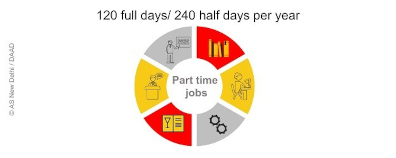
Can I work in Germany after my studies?
After completing your degree in Germany, you can choose from amongst a wide range of options:
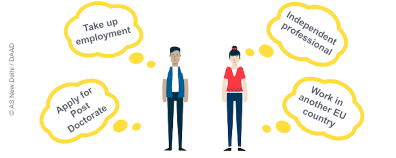
You can stay on in the country for up to 1.5 years to look for a job that is in keeping with your education. Once you find a job, the residence permit issued to you for the purpose of studying, can be converted into a residence permit for taking gainful employment.
Germany has always had a very strong industry-academia linkage. A lot of scientific research is funded by the industry as well. During your studies you can get the opportunity to do internships with German companies, which can open new vistas for your professional career.
In Germany, a doctorate is a prerequisite for a career in research or higher education. Your options include:
- Teaching/Research Assistantships
- Postdoc Positions
- Research Positions in Industry
The portal www.academics.com has Germany’s biggest online job market for researchers. There are also scholarships for Postdocs offered by the Alexander-von-Humboldt Foundation and other organizations.
Whether you are in India, Nepal or Bhutan, the DAAD is there to help you with your study in Germany plans. Check out how you can reach us!
Individual Appointments
You can connect with the DAAD offices online or offline in Bengaluru , Chennai , New Delhi and Pune .
Information Sessions
The DAAD offers free of cost information session about studying in Germany regularly. Check which dates and topics suit you, register and join!
Click here for dates, timings and registration links: www.daad.in/events .
Writing a Research Proposal
Take a look at the DAAD’s guidelines for writing research proposal
Research Proposal writing: Guidelines 2023
PhD Proposal Writing Workshop
Wondering how to write a PhD proposal? The DAAD offers PhD Proposal Writing Workshop on various topics for aspirants who intend to pursue their doctorate in Germany!
Early Career Research Symposia
The Early Career Research Symposia offer you a platform to help you propel your research, amplify its reach and get inspired by exchange of ideas.
- Did you find the information about doctoral studies in Germany useful? Keep the digital PhD brochure with you, so that it is all handy!
- You will also find the digital brochure Research Proposal Guidelines 2023 useful.
- There is comfort and certainty in numbers. With the fact sheet Germany India 2022 you can check out actual number of Indian students, what fields they are opting for and which universities they have preferred.

- PhD Programmes
Research Proposal Writing
The main objective of this course is to equip ERIM PhD students with general knowledge about the structure, style and quality of a research funding application. At the end of the course the students:
- Are familiar with the most important Dutch and European funding bodies and funding schemes
- Understand the relevance of research funding and its increased importance in recent years
- Know the main characteristics of the writing style of a funding application and are able to recognise and implement the style
- Know the basic components and structure of a funding application and are able to compose a draft funding application along this structure
- Are able to compose a clear and attractive proposal abstract
- Understand the basics of the funding evaluation process
Information
The course combines a more theoretical perspective on the development of funding for research in recent decades with more practical writing skills. During the course PhD students are made familiar with the outline of a funding proposal and its basic components such as context, approach and impact. Participants receive several small assignments that are completed during the lectures. A final assignment is given after the course is completed.
Students are given small assignments during the course: one assignment focuses on the relevance of research funding, based on a discussion paper. The second small assignment focuses on abstract writing. The final assignment is the composition of a draft research proposal. The assignment is given at the end of the course. The draft funding proposals are assessed by the lecturers
Extensive information on research funding and how to write a research proposal is available on www.erim.eur.nl/funding/useful-documents/
Additional info
The course is an intensive course with a maximum of 15 participants, allowing for open discussions and interactions based on constructive feedback

- © 2024 Erasmus Universiteit Rotterdam
- Privacy statement

Thank you for visiting nature.com. You are using a browser version with limited support for CSS. To obtain the best experience, we recommend you use a more up to date browser (or turn off compatibility mode in Internet Explorer). In the meantime, to ensure continued support, we are displaying the site without styles and JavaScript.
- View all journals
- Explore content
- About the journal
- Publish with us
- Sign up for alerts
- Published: 15 May 2024
How Iranian students can master integration into German academia
- Ata Makarem ORCID: orcid.org/0000-0003-1291-4312 1 , 2 &
- Karel Douglas Klika ORCID: orcid.org/0000-0001-7009-1487 3
Nature Physics ( 2024 ) Cite this article
Metrics details
Thousands of Iranians study at German universities every year, but many struggle with the German academic system. Here, we offer some advice.
This is a preview of subscription content, access via your institution
Access options
Access Nature and 54 other Nature Portfolio journals
Get Nature+, our best-value online-access subscription
24,99 € / 30 days
cancel any time
Subscribe to this journal
Receive 12 print issues and online access
195,33 € per year
only 16,28 € per issue
Buy this article
- Purchase on Springer Link
- Instant access to full article PDF
Prices may be subject to local taxes which are calculated during checkout
Knerr, B. International Labor Migration: Asian students in Germany Ch. 6 (Kassel University Press GmbH, 2015).
Hüther, O. & Krücken, G. Higher Education in Germany — Recent Developments in an International Perspective , Vol. 49 (Springer International Publishing, 2018).
Moradi, S. Nat. Hum. Behav. 3 , 1025–1025 (2019).
Article Google Scholar
Download references
Author information
Authors and affiliations.
Department of Chemistry, University of Hamburg, Hamburg, Germany
Ata Makarem
Mannheim Business School, University of Mannheim, Mannheim, Germany
Molecular Structure Analysis, German Cancer Research Center (DKFZ), Heidelberg, Germany
Karel Douglas Klika
You can also search for this author in PubMed Google Scholar
Corresponding author
Correspondence to Ata Makarem .
Ethics declarations
Competing interests.
The authors declare no competing interests.
Rights and permissions
Reprints and permissions
About this article
Cite this article.
Makarem, A., Klika, K.D. How Iranian students can master integration into German academia. Nat. Phys. (2024). https://doi.org/10.1038/s41567-024-02490-4
Download citation
Published : 15 May 2024
DOI : https://doi.org/10.1038/s41567-024-02490-4
Share this article
Anyone you share the following link with will be able to read this content:
Sorry, a shareable link is not currently available for this article.
Provided by the Springer Nature SharedIt content-sharing initiative
Quick links
- Explore articles by subject
- Guide to authors
- Editorial policies
Sign up for the Nature Briefing newsletter — what matters in science, free to your inbox daily.
The Ohio State University
- BuckeyeLink
- Search Ohio State

Jankovics Punches Ticket to Paris Olympics

Electrical and Computer Engineering sophomore and OSU Swim & Dive Team member Tristan Jankovics officially secured his place on Team Canada for the 2024 Paris Olympics last night at the Canadian Olympic Trials. Jankovics turned in an Olympic qualifying time of 4:11.74 in the 400 IM to win the event and earn his spot on the Olympic team. Jankovics is the third Buckeye swimmer to qualify for the Paris Olympics so far joining Tomas Navikonis (Lithuania) and Lena Hentschel (Germany).

Related News


IMAGES
VIDEO
COMMENTS
Methodology. This is a very important part of your research outline and should receive a lot of attention. It may well be the longest section of your proposal. Give detailed information about how you intend to answer your research questions. Anyone who reads your proposal will want to know the sources and quality of evidence you will consult ...
Please read the guideline How to Develop a Research project and Write a Research Proposal [PDF 191.14 KB]. As a rule, every applicant is expected to submit a self written research proposal! In case you are applying for a structured PhD programme, you also are required to submit a statement of purpose/ letter of motivation.
A research proposal should be clear, coherent and compelling, contain all the key elements involved in the research process and include sufficient information for the committee to evaluate the proposed study. The proposal should situate the project's objectives in the context of existing research, debates and literature on the topic.
Crafting an exemplary research proposal for your PhD hinges on strategic elements. Here's your roadmap to success: Purposeful Introduction: Articulate the rationale behind your proposal. Clearly elucidate the objectives of your research project, painting a vivid picture of its significance. Detailed Project Description: Delve into the specifics.
Crafting an exemplary research proposal for your PhD hinges on strategic elements. Here's your roadmap to success: Purposeful Introduction: Articulate the rationale behind your proposal. Clearly elucidate the objectives of your research project, painting a vivid picture of its significance. Detailed Project Description: Delve into the ...
When applying for a PhD position or a research grant in Germany, you will usually be asked to submit a research pro-posal, at least in part, since individually led research is still the norm in most subject areas. ... It is rarely possible to write a comprehensive proposal in fewer than 1,500 words. The proposal should have a proper layout ...
Key words: 3 -5 words of the most important topics of the research proposal. Abstract of the proposal it should be concise, clear, informative and self-explanatory. It should provide an accurate account of the proposal. The following points should be included: The reason for doing the research. The objectives of the research.
The online GERiT database of more than 25,000 research institutions will help you with your search: www.gerit.org. PhDGermany has PhD openings specially targeted at international doctoral students: www.phdgermany.de. You can find funded doctoral positions on the website of the German Research Foundation (DFG):
And your proposal should be written honestly. The research aim, working schedule, and financial budget should reflect the actual aims and necessities and they should be consistent. If you clearly explain what the funds are needed for, referees will be reluctant to shorten the proposed budget. This does not mean that your proposal needs to be ...
Generally, however, as a first step you will need to submit a curriculum vitae, a copy of your degree certificate, a brief description of your doctoral research proposal and a letter outlining the reasons for your application. The second step, usually on request, involves a detailed application with a comprehensive exposé of the research project.
Before starting your doctoral studies in Germany, there are some important steps you have to follow: Have your post-graduate degree recognised. Apply for a residence permit. Find a doctoral position. Finance your research stay. To find some practical advice on preparing your research stay - visit: www.research-in-germany.org > phd.
Research in Germany - How to write a research proposal and apply for a PhDDAAD臺北德國學術交流資訊中心與德國達姆施塔特工業大學 (Technical ...
Written by Mark Bennett. You'll need to write a research proposal if you're submitting your own project plan as part of a PhD application. A good PhD proposal outlines the scope and significance of your topic and explains how you plan to research it. It's helpful to think about the proposal like this: if the rest of your application explains ...
Access to a Doctorate. The information below is to give potential doctoral candidates a general idea of doctoral studies at Humboldt-Universität. They might be helpful to you to make your decision. The Humboldt Research Track Scholarship funding line is intended to facilitate the transition from undergraduate studies to doctoral studies for ...
Academic degree recognized in Germany. Typically, you'll need a master's degree or a German state examination (Staatsexamen) to qualify for a PhD program. Copy of master's thesis. Provide a copy of your master's thesis, showcasing your research skills and the depth of your academic work. Research proposal.
1. Title. Your title should indicate clearly what your research question is. It needs to be simple and to the point; if the reader needs to read further into your proposal to understand your question, your working title isn't clear enough. Directly below your title, state the topic your research question relates to.
However, no matter where you conduct your research, a professor will always supervise your PhD. You can obtain a doctorate by pursuing research: at a university. at a non-university research institute or. in a German company. PhD at a university. PhD at a non-university research institute. PhD in industry.
Research proposal examples. Writing a research proposal can be quite challenging, but a good starting point could be to look at some examples. We've included a few for you below. Example research proposal #1: "A Conceptual Framework for Scheduling Constraint Management".
Online. 4 April - Geo & Hydro Science Research Ambassadors Dr Amar Agarwal, IIT Kanpur and Dr Ankit Agarwal, IIT Roorkee with Team DAAD New Delhi; 5 April - Biology Research Ambassadors Dr Avinash Sonawane, IIT Indore and Dr Jaydeep Bhattacharya, JNU, New Delhi with Team DAAD IP Chennai; 6 April - Social Science Research Ambassadors Dr Milind Brahme, IIT Madras and Dr Farhat Naz, IIT ...
PhD Studies. With a long tradition of research and ground breaking discoveries, Germany is indeed a land of innovation and progress. Besides giving your ideas a research-based boost, Germany also offers promising career opportunities along with a vibrant social and cultural milieu. So like for many other international students, it can be the ...
3. Approaching German professors via e-mail. While there are no hard and fast rules as to how to write a successful email, here are some guidelines you may find useful when first making contact with a German professor. Make sure your e-mail does not contain any grammatical or typing mistakes.
The main objective of this course is to equip ERIM PhD students with general knowledge about the structure, style and quality of a research funding application. At the end of the course the students: Are familiar with the most important Dutch and European funding bodies and funding schemes Understand the relevance of research funding and its increased importance in recent years Know the main ...
Welcome to our detailed guide on writing the introduction section of a research proposal. This video is perfect for PhD students, researchers, and academics ...
Welcome to Academic English Now! In this video, join Alexis Mowrey, a PhD student specializing in adjunct therapy, as she shares invaluable tips for accelera...
The number of Iranians studying in Germany has increased over the past decade 1. However, the differences between the cultures and academic systems of the two countries make integration into ...
Learn the step-by-step process of crafting a compelling research proposal from start to finish in this comprehensive guide. Whether you're pursuing a scholar...
Jankovics qualifies for Team Canada 2024 - photo by Walt Middleton. Electrical and Computer Engineering sophomore and OSU Swim & Dive Team member Tristan Jankovics officially secured his place on Team Canada for the 2024 Paris Olympics last night at the Canadian Olympic Trials. Jankovics turned in an Olympic qualifying time of 4:11.74 in the 400 IM to win the event and earn his spot on the ...